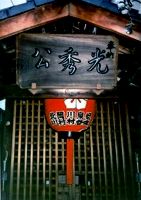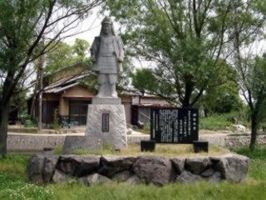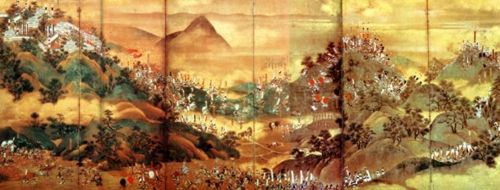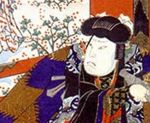THE UNPRETTY
END
OF
AKECHI MITSUHIDE
Toyotomi Hideyoshi was too darn busy in the western part of Japan when Oda Nobunaga died (click here for story and pictures). That's part of Akechi Mitsuhide's reason to pick exactly that moment to attack Oda. Toyotomi was doing what Oda wanted him to -- conquering the realm formerly belonging to the unbeatable Mori clan. He did that not by military stuff because long siege of the strongest castle there didn't even work; he got the territory by relying on his wit and diplomatic skill. The news of Oda's death faraway in Kyoto reached him in mere 24 hours, via a super-express messenger who nearly died of exhaustion when he got there. This man wasn't the official Oda clan's messenger. He was a civilian, sent by another civilian -- Oda Nobunaga's personal acquaintance in Kyoto (Oda Nobunaga's buddies for hanging out with were mostly mobile merchants, not samurai). Toyotomi and his captain Kuroda Kanbei kept this a secret, and somehow the Mori clan believed his lie that Oda Nobunaga was on his way to reinforce the troops. Fearing Oda's arrival, the clan surrendered. At once Toyotomi marched his men to catch up with Akechi Mitsuhide. He got the Akechi clan by total surprise; they thought it was impossible that he had heard the news at all, let alone to act upon it. They thought that Toyotomi, as a 'nobody' in the Oda clan (revenge, traditionally, must be decided by a relative of the dead), would have consulted Lord Shibata Katsuie of Echizen first -- after all, Shibata was Oda Nobunaga's cousin. All that Toyotomi's mind was occupied with was just to avenge Oda Nobunaga's death a.s.a.p. That would also ensure that time was in his hands -- a loyal vassal could be entitled to wear the late master's shoes. Of course Toyotomi won the battle against Akechi. Mitsuhide had lost his guts days before; the man he feared most was Toyotomi, but he relied on other vassals of the Oda clan to back him up -- and none of them showed up. There was one Oda General who said "I'll think about it" -- Lord Tsutsui Junkei, who was rather close with Akechi Mitsuhide before this happened -- but he only said so to Akechi's messenger to avoid offending him, because his opportunistic streaks told him to wait to see who was likely to win this inevitable war (he joined Toyotomi a bit too late for the latter's taste, and was 'fined' for that, since it obviously indicated that he could have joined Akechi if that side seemed like winning). On the other hand, when receiving Toyotomi Hideyoshi's messengers, everyone went to his camp instantly. The first who got there was the Christian General, Lord Takayama Ukon, and the peacemaker of the Oda joint army, Lord Niwa Nagahide. Others followed one by one. (Click here for story and pictures of Oda Nobunaga's Generals). Akechi Mitsuhide died at the end of the day. It wasn't a pretty death that claimed Akechi Mitsuhide; he and a few of his staunchest followers galloped away when absolute defeat was certain. Unfamiliar tracks got them lost. Some regular bandits spotted the helpless gentlemen and dashed to catch them up. Normally such creatures wouldn't have dared to mug samurai, but the Akechi clot was so obviously losing all hopes, it changed the convention for this once. Akechi Mitsuhide 'ruled' Japan for 13 days. No more than that. All of Oda's Generals refused his invitation to build a new regime together. The Emperor refused even to comment on it. 'Akechi ruled thirteen days' became a proverb in Kyoto instantly after his demise.
The
battle against Akechi clan was initiated and led by Toyotomi Hideyoshi,
followed by Niwa Nagahide, Click the pic for history & pictures of Oda Nobunaga's Generals, Captains, and army management.
Of course there are those who see this fact in some other light. That's why Akechi Mitsuhide's shrine got erected to begin with. But as far as I'm concerned, he put off the light of the century precisely when the Honno temple crumbled in the blaze that morning.
P O S T S C R I P T : There have been some visitors of this section asking why haven't I put in Akechi Mitsuhide's poem -- the one that he wrote when he was dying, after getting attacked by the rural bandits and pursued by local villagers (the normally placid villagers were dangerous as far as losers of a war were concerned; click here for illustrations). So here it is, Akechi's poem: It's
not true that two gates exist: loyalty and betrayal There have been sorts of historical-minded people who insist that Oda Nobunaga got very jealous of Akechi Mitsuhide's 'poetic ability', and thus especially nasty to this poetically-genius vassal. That's an extremely funny notion -- of all people, Oda knew he had no talent for poetry, and as far as existing records show, he was content by liking the thing without making one himself. Besides, the so-called 'poetic ability' of Akechi Mitsuhide's exists only in the same realm that got unicorns and talking dragons and Harry Potter. Savvy?
A F T E R M A T H : Akechi Mitsuhide's clan, especially his own nuclear family, suffered much because of his betrayal of Oda Nobunaga's trust. Whoever survived the battles were put under house-arrests. Most of these were, as a matter of course, women. One of them was Akechi Tama, Mitsuhide's daughter, wife of Hosokawa Tadaoki. The Hosokawa clan was one of the remarkable samurai families whose survival instincts worked the best; unshaken by the changing of times. Anyway, Tama broke Hosokawa's heart by getting herself a conversion to Christianism, something abhorred by most samurai even though there were Catholic warlords like Konishi and Ito. After baptismal, Tama discarded her Japanese name and used the Catholic one; since then on she wished to be addressed to as Hosokawa Gracia. The Roman Catholic Church canonized her. She is today Saint Gracia. She is the real-life person whose bio inspired novelist James Clavell to write Shogun in late 1970's; a winding tale woven in the usual touristic approach and exoticism. Her bio was mixed in this novel with that of real-life Englishman Will Adams, who arrived (shipwrecked) at Edo (Tokyo) in 1607, and stayed (confined) there until he died (real death) in 1620. The British liner's captain Adams was kindly treated by Shogun Tokugawa Hidetada, and even got sort of chummy with Ieyasu, but if he got homesick then all that wouldn't suffice -- he was never allowed to leave Japan, since the shogunate didn't want any foreigner to tell what it was like in there and suspected that Adams would get back again to Edo with some XL baggage: other Englishpersons. To while away time, Adams was given a special permit to live with a local woman. They had several kids, and according to folktales the descendants of Adams' are still there now. Clavell clearly lifted things up from Adams' bio, including the name the Japanese called Adams by in his times: 'Mister Pilot' ('Anjin-san').
The central character of the novel is named 'Mariko', who is just like Akechi-Hosokawa Tama-Gracia. It was turned into a movie starring Richard Chamberlain in 1980 or so.
|
NEXT PAGE : PICTURES OF THE CHRONOLOGY OF EVENTS ON JUNE 21, 1582









